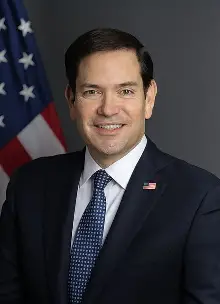United States Secretary of State Marco Rubio arrived in Israel on Sunday in an effort to ease tensions between Washington and its regional allies following Israel’s attempted assassination of senior Hamas figures in Qatar and the continued expansion of settlements in the occupied West Bank.
Rubio is holding talks with Israeli Prime Minister Benjamin Netanyahu, seeking to balance criticism of the airstrike in Doha with a reaffirmation of US support for Israel. The strike, which targeted a building in an upmarket district of the Qatari capital, killed aides to a Hamas leader and a Qatari security officer. It was Israel’s first such attack on Qatar, a US ally, and has drawn widespread international condemnation.
The visit comes ahead of an expected move by several US allies, including the United Kingdom, France, Canada, Australia and Belgium, to formally recognise the State of Palestine. The recognition is anticipated to be announced at a United Nations gathering later this month, reflecting growing frustration over Israel’s conduct in Gaza and the West Bank.
Speaking before his departure, Rubio said: “Obviously, we’re not happy about it. The president was not happy about it. Now we need to move forward and figure out what comes next.” He added that the incident would not alter the fundamental nature of US-Israel relations.
Israeli officials have sought to downplay any rift with the Trump administration. Israel’s ambassador to the UN, Danny Danon, told army radio that coordination with Washington remained close and described the US reaction as “reasonable” given the circumstances. He acknowledged that the strike carried a diplomatic cost but insisted Israel would continue to pursue Hamas leaders “everywhere”.
Asked about Israeli threats of further strikes in Qatar, Rubio said he would use his meetings to gain a clearer understanding of Israel’s plans.
Following his visit to Israel, Rubio is scheduled to join President Trump in Britain, which is preparing to receive its first group of injured and sick children from Gaza for medical treatment.
The Doha strike targeted Hamas leaders who were reportedly meeting to discuss a new US-backed ceasefire proposal. President Trump has publicly criticised Netanyahu over the operation, while the Israeli leader has defended it, arguing that eliminating senior Hamas figures would remove the “main obstacle” to ending the war.
The ceasefire remains elusive after months of failed negotiations. In recent days, Israel has intensified its military campaign in Gaza, focusing on seizing control of Gaza City. The Israeli military has ordered evacuations and destroyed multiple high-rise buildings it claims were used by Hamas. Thousands have fled, but many residents remain in the city. Gaza’s civil defence agency reported that 32 people were killed by Israeli fire on Saturday.
International criticism of Israel’s nearly two-year war in Gaza continues to mount. On Friday, the UN General Assembly voted to support a revival of the two-state solution, despite Israeli opposition. Britain, France and other Western nations have also called for an immediate halt to Israel’s offensive in Gaza City.
Despite this, Israel retains the backing of the United States, its most significant ally and largest arms supplier. State Department spokesperson Tommy Pigott said Rubio’s visit would reaffirm US opposition to “anti-Israel actions including unilateral recognition of a Palestinian state that rewards Hamas terrorism” and stress shared goals of preventing Hamas from ruling Gaza and securing the release of hostages.
Domestically, Netanyahu faces pressure from the Hostages and Missing Families Forum, which accuses him of obstructing ceasefire efforts that could secure the release of Israeli captives. Of the 251 people taken hostage during Hamas’s 7 October 2023 attack on Israel, 47 remain in Gaza, including 25 confirmed dead by the Israeli military.
The war began with Hamas’s assault, which killed 1,219 people in Israel, mostly civilians. Israel’s subsequent military campaign in Gaza has killed at least 64,803 people, also mostly civilians, according to figures from Gaza’s Hamas-run health ministry, which are regarded by the UN as credible.



